Zabel's dream apprentice
Age: 24 Born: July 27, 1980 Height: 172cm Born: Bundaberg VO2max: 80 ml/kg/min Marital status: Wife...
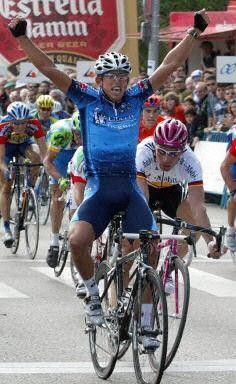
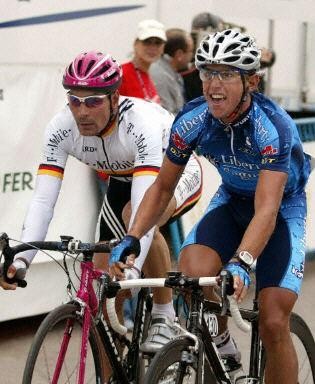
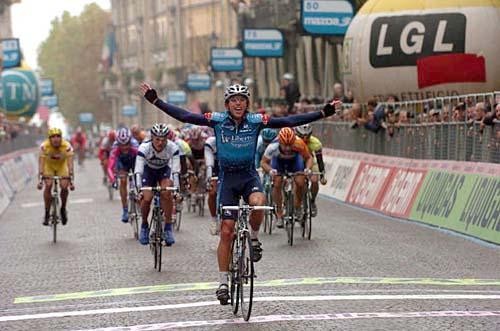
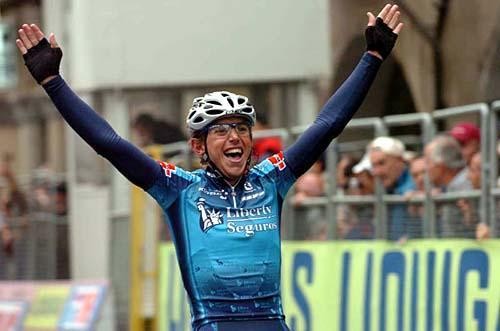
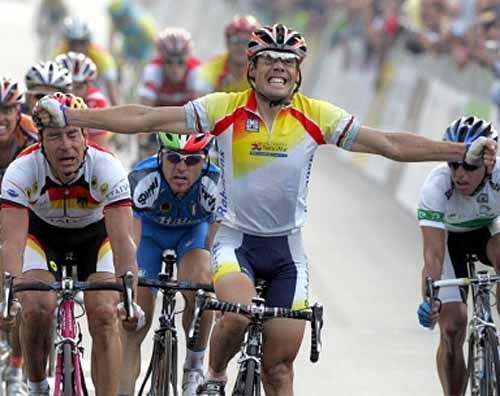
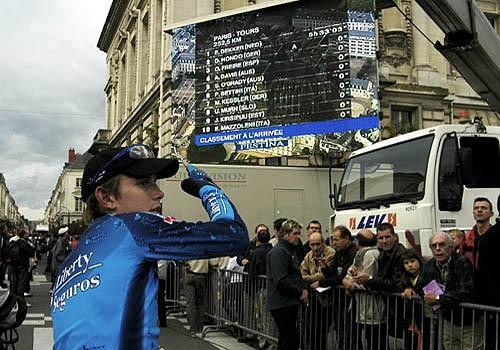
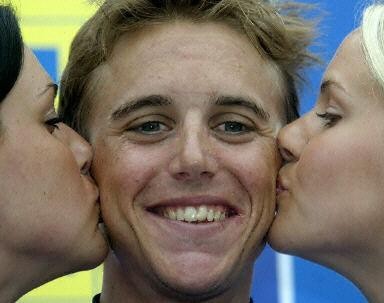
An interview with Allan Davis, November 6, 2004
He may be only 24 years old and he may be from the other side of the world, but Aussie Allan Davis has just enjoyed his best season ever and has caught the eye and attention of one of the greatest modern day riders, who has a dream of taking him under his wing and becoming his lead-out man. Anthony Tan speaks to Erik Zabel's dream apprentice.
"One of my dreams is that [Walter] Godefroot, the manager of our team, takes Davis, Allan Davis under contract, and I will be his lead-out man for one or two years more to help him to be one of the best sprinters."
"You think he has got class?" replied our slightly bemused Cyclingnews correspondent Martin Hardie to Erik Zabel on the eve of the final time trial at this year's Vuelta a España, unwilling to let the German's bone-dry humour get the better of him so soon.
"When he comes [to Europe] in February, every year he is in good shape from the races in Australia, and then in Vuelta of Majorca he is nearly unbeatable," said the now quite clearly serious Zabel, after being beaten by Davis this year at the aforementioned Challenge Illes Balears races. Twice in four days, in fact.
"I think with very good lead-out men and with a little more experience, he will be like Tom Boonen in the sprints," he predicted.
Assured he was no longer kidding, our correspondent went on to say: "I heard a few days ago from someone close to the Australian team that he actually thinks Allan Davis could win [the World Road Championships] in Verona... "
Get The Leadout Newsletter
The latest race content, interviews, features, reviews and expert buying guides, direct to your inbox!
To which Zabel replied: "Why not?"
If it hadn't been for a reckless hook in the final sprint - which many believed to be a breach of the rules - that Aussie insider may well have been right.
Having learned from their mistakes in the Athens Olympic road race, the Australians played the perfect waiting game at the World's. Feeding off the Italians' panic resulting from Bettini's withdrawal and by sticking to the wheels of the Spaniards, both Davis and Stuart O'Grady were in the winning move of 25 riders with just one lap of 15 kilometres remaining.
Pundits believed the race for the rainbow jersey was going to be decided on climb of the Torricelle, and as the lead group began their final ascent, a series of attacks and counterattacks created a lead group of six at the top - in there were Italians Basso and Cunego, Spaniards Freire and Valverde, Dutchman Michael Boogerd and the freckle-faced O'Grady.
It appeared the pundits had got it right; for the others, it looked to be all over, red rover.
But Davis wasn't panicking: "I was pretty confident it was going to come back, but quietly confident, because you never know," he recalls.
"At the end of 250 kilometres, there's a lot of tired bike riders, but there's a lot of good bike riders, strong enough to get the gap to make it to the finish. But I was pretty confident it was going to come down to a sprint - especially having the Germans controlling [the pace] in the back."
Sure enough, with Zabel, Danilo Hondo and Stefan Wesemann not part of the sextet but metres behind, the German trio returned most of the original group back into the fold. Davis - by far the youngest member of the group - was once again in contention, and with the possibility of becoming world champion among a who's who of cycling stars at 24 years-old, he had to pinch himself, a reminder that it was all real, and all good.
"Yeah... it was a bit like that," he laughs when quizzed on the mildly surreal situation "... but I just tried to keep it focused."
Under the flamme rouge, Valverde was intent on leading out it for two-time, soon to be three-time winner Oscar Freire, and with Zabel glued to the Spaniard's wheel, first and second place appeared to be sewn up. However, on the left, Davis had turned on the afterburners and was coming at warp speed, destined to take a medal at the minimum.
Then hard-luck intervened. An unsportsmanlike elbow by Italian Luca Paolini almost put the Aussie into the barriers at 60 kilometres an hour, the Italian bullying his way to the bronze, while a brilliant recovery still saw Davis finish fifth behind his compatriot O'Grady.
Cyclingnews reporter on the day, Tim Maloney, wrote: "The overhead replay of the sprint shows that Davis was coming by Paolini on his left, fast enough to take at least a bronze medal, when the Italian aggressively elbowed him and intentionally impeded the Australian's progress. This denied Davis at least a bronze medal, but the officials didn't relegate Paolini despite what looked to be a breach of the rules."
Four weeks later, Davis continues to reel in the effects of what might have been.
"There hasn't been a day go past where I haven't thought about it," he says, unable to hide his disappointment.
"I didn't get to talk to them [the commissaires] myself," says Davis when asked if he protested, "but I sort of let people know it happened; [the hook] was pretty clear and it would be fair enough to say there was a hook and it definitely delayed my momentum in the final metres, but I don't know why... " he says as his voice trails off, still in disbelief. "I'll try and let it go and worry about the future now," he adds, though rather unconvincingly.
Despite the bitterness, the future is something Allan Davis should worry about. As in worry what he's going to do with all the money he's likely to earn as one of the the world's top bike riders a few years from now.
One week after Verona, the boy from Bundy bounced back to swap positions with O'Grady at Paris-Tours, and if it hadn't been for the audacious ride by Erik Dekker, who stole victory by the barest of margins, Davis would have found himself on a World Cup podium for the first time in his life.
With no bully-boy Paolini to worry about in the sprint, could the Bundy-boy have done anything differently to find himself on the podium?
"No - I did everything I could," he says without even thinking.
Explains Davis, "Going across to the break on the last climb, there was five of us away and we sort of looked at each other at one point and Dekker and [Matthias] Kessler just rode off the front and got a bit of a gap; the three of us behind just looked at each other and we all had the same idea of saving ourselves for the sprint."
With the bunch screaming down on the trio just 12 seconds behind, he had two options: "Hit across to the two [up front] or play our chances at the group catching us," he remembers.
Davis chose the latter, but like the rest of the bunch, totally underestimated the strength and cunning of the flying Dutchman, who kicked again to hold off a 60-strong peloton, signalling a welcome return to his attacking best.
"Yeah, awesome ride... " he chuckles, as if he still can't believe how Dekker did it. "I didn't think he'd go all the way when we caught him at the end, but he used his head and what he had left in the legs to win the bike race; I can't really take anything away from Dekker, he deserved it."
But one thing was clear: Davis was in the form of his life, and it only took another four days before he clinched his biggest career win at the Giro del Piemonte, his fifth of the season.
Asked if he was looking for a win, having ridden the 200 kilometre-long Milano-Torino classic the day before, Davis says in his typically modest way he was more than confident: "I knew the form was good; the last month I was always consistent and recovering well, so I wasn't too worried about the distance and having two back-to-back races in a row," he says.
"It was an uphill sprint on pave at the end, so I was suited to it a bit more; the team got it together at the end, we tried our luck... and pulled it off!"
There's no doubt team manager Manolo Saiz saw the potential in the then 22 year-old when he grabbed the Mapei-Quick.Step stagiaire to ride for ONCE-Eroski at the end of 2002, and has carefully been grooming him ever since. Says Stuart O'Grady of Saiz: "Manolo is a very smart man and he's not going to make a mistake with such a gifted rider.
"I think Alby's got the world at his feet," adds Cofidis' number one rider in 2004. "He's going to become one of the best one-day Classic riders around - he's got a massive future."
Coincidentally, Davis' future is following a very similar vein to that of O'Grady. Milan-San Remo, Amstel Gold, Flèche Wallonne and Liège-Bastogne-Liège are likely targets in 2005, not forgetting the Australian Road Championships in mid-January (he finished second to O'Grady in 2003) and the early season races in Majorca, which he invariably excels at. Especially against Erik Zabel.
And with his Tour de France debut this year in the bag and fully completed, Alby can't wait for more. "I've sort of been bitten by the [Tour] bug now, and am fighting to get back there!" he says excitedly.
"But it's probably the hardest thing I've ever done," adds Davis, facing every bike rider's juxtaposition between pain and pleasure.
Under contract with Liberty Seguros until 2006, it appears Mr. Zabel's going to have to wait at least another two years yet before becoming Davis' lead-out man - he'll be 35 then. And will his manager Walter Godefroot be able to afford him?
Also see: 2003 interview with Allan Davis - Hitting the big time
Other Talking Cycling Interviews